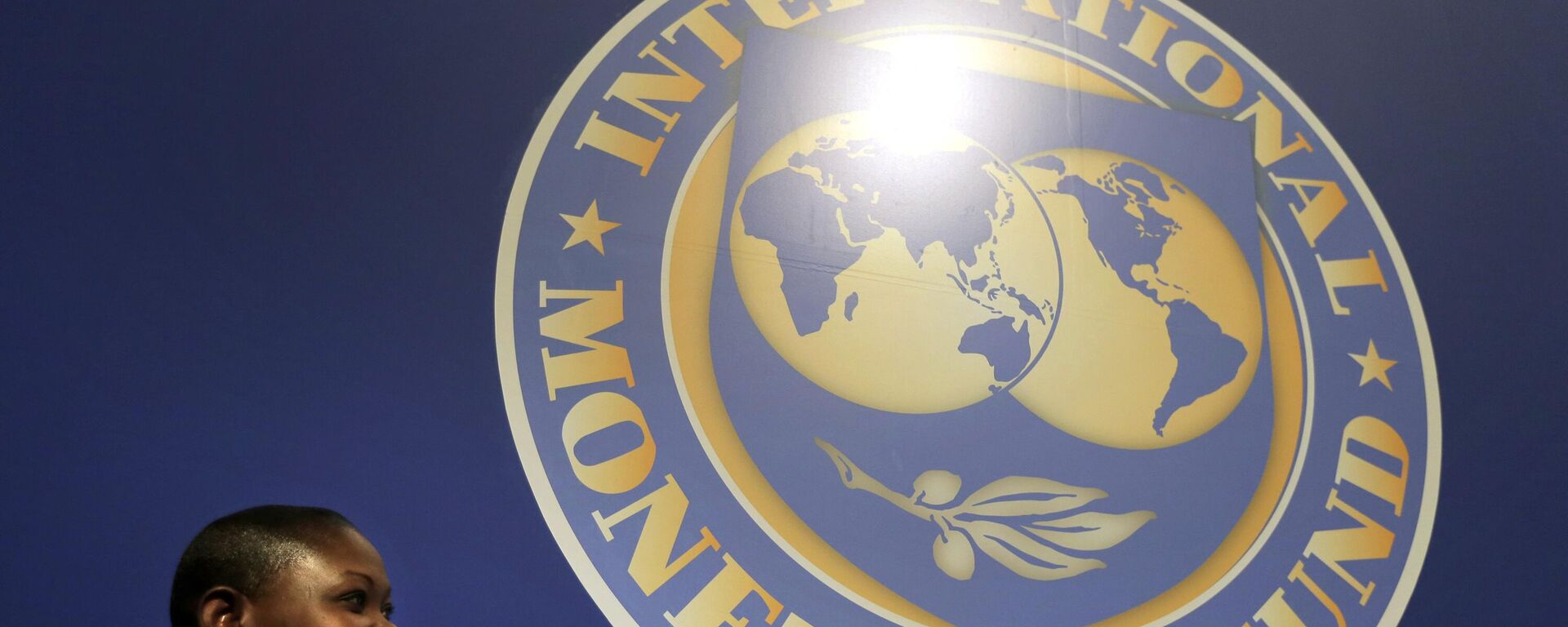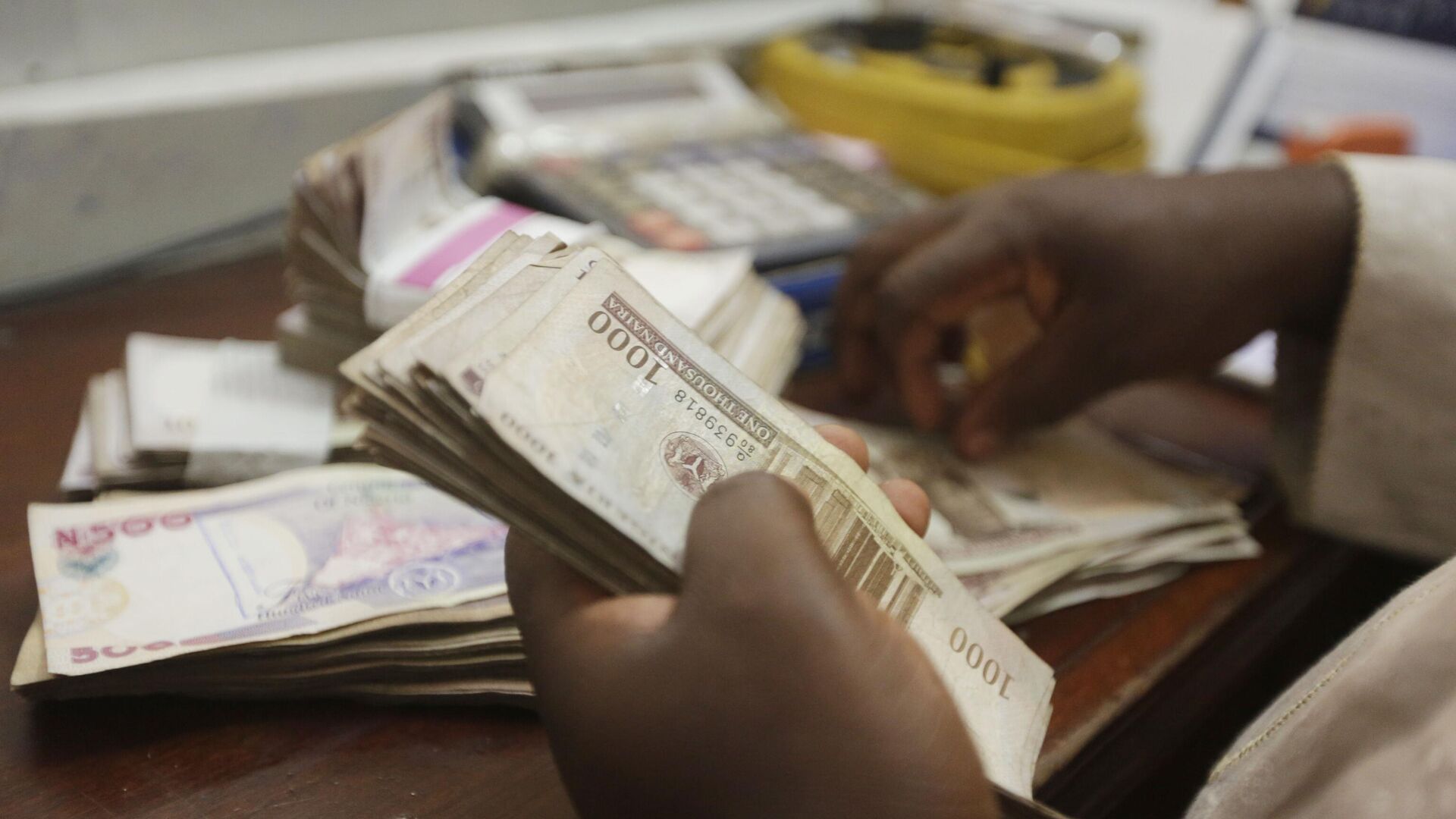https://sputnikglobe.com/20230208/nigerian-supreme-court-suspends-banknote-transition-deadline-amid-naira-scarcity-1107079461.html
Nigerian Supreme Court Suspends Banknote Transition Deadline Amid Naira Scarcity
Nigerian Supreme Court Suspends Banknote Transition Deadline Amid Naira Scarcity
Sputnik International
Nigeria's Supreme Court has temporarily suspended the deadline for transition to new naira banknotes, media report. Acceptance of the old Naira notes was initially planned to end on 10 February.
2023-02-08T16:51+0000
2023-02-08T16:51+0000
2023-02-08T16:51+0000
africa
west africa
nigeria
central bank
currency
banknote
crisis
economy
finance
court
https://cdn1.img.sputnikglobe.com/img/07e7/02/08/1107081674_0:160:3073:1888_1920x0_80_0_0_380f33169716852f64c64cbab6714dbb.jpg
Nigeria's Supreme Court has temporarily suspended the deadline for the transition to new naira banknotes, the country's media report. Acceptance of the old 200, 500, and 1,000 naira notes was initially planned to end on February 10.The decision came after a lawsuit was launched by the states of Kaduna, Zamfara, and Kogi against the federal government at the Supreme Court in order to compel the federal authorities and the CBN to stop implementing the transition – due to banknote scarcity and the difficulties that have arisen from it. The legal case has been adjourned until February 15.The lack of currency in Nigerian banks led to long queues and protests as people tried to acquire new banknotes.According to Aisha Dikko, the attorney general and commissioner for justice, Kaduna State, the naira redesign policy was launched as part of the federal government's efforts to transition to a cashless economy; however, cash is required for several types of transactions. She also underlined that people in rural areas, where the majority of the three states' population lives, do not have access to banks and are unable to deposit their savings, which are still mostly in old banknotes.Against the backdrop of the naira reform, Nigeria has also seen growth in demand for alternative assets, such as for cryptocurrency, namely bitcoin. According to Google Trends, Nigeria is one of the nations most interested in cryptocurrency.As part of its attempts to establish a cashless economy, in 2021, Nigeria became the first country in Africa to introduce a central bank digital currency – the eNaira. The country's government stated that the currency "serves as both a medium of exchange and a store of value, offering better payment prospects in retail transactions when compared to cash payments."In November 2022, Nigeria's government announced that it would not include cryptocurrences in its plan to improve trading in digital assets due to high risks and a lack of standards for protection of investors.
https://sputnikglobe.com/20230204/top-largest--fastest-growing-economies-in-sub-saharan-africa-in-2023-1106951646.html
africa
west africa
nigeria
Sputnik International
feedback@sputniknews.com
+74956456601
MIA „Rossiya Segodnya“
2023
News
en_EN
Sputnik International
feedback@sputniknews.com
+74956456601
MIA „Rossiya Segodnya“
Sputnik International
feedback@sputniknews.com
+74956456601
MIA „Rossiya Segodnya“
naira crisis, new naira, nigeria currency, naira deadline, nigeria court, nigeria banknotes, naira banknotes, nigeria inflation
naira crisis, new naira, nigeria currency, naira deadline, nigeria court, nigeria banknotes, naira banknotes, nigeria inflation
Nigerian Supreme Court Suspends Banknote Transition Deadline Amid Naira Scarcity
The redesign of the naira, Nigeria's currency, was launched by the Central Bank of Nigeria (CBN) in an attempt to tackle inflation – which currently stands at 20% – by curbing counterfeiting and promoting the use of digital assets.
Nigeria's Supreme Court has temporarily suspended the deadline for the transition to new naira banknotes, the country's media report. Acceptance of the old 200, 500, and 1,000 naira notes was initially planned to end on February 10.
The decision came after a lawsuit was launched by the states of Kaduna, Zamfara, and Kogi against the federal government at the Supreme Court in order to compel the federal authorities and the CBN to stop implementing the transition – due to banknote scarcity and the difficulties that have arisen from it. The legal case has been adjourned until February 15.
The lack of currency in
Nigerian banks led to long queues and protests as people tried to acquire new banknotes.

4 February 2023, 08:54 GMT
According to Aisha Dikko, the attorney general and commissioner for justice, Kaduna State, the naira redesign policy was launched as part of the federal government's efforts to transition to a cashless economy; however, cash is required for several types of transactions. She also underlined that people in rural areas, where the majority of the three states' population lives, do not have access to banks and are unable to deposit their savings, which are still mostly in old banknotes.
Against the backdrop of the naira reform, Nigeria has also seen growth in demand for alternative assets, such as for cryptocurrency, namely bitcoin. According to Google Trends, Nigeria is one of the nations most interested in cryptocurrency.
As part of its attempts to establish a cashless economy, in 2021, Nigeria became the first country in Africa to introduce a central bank digital currency – the eNaira. The country's government stated that the currency "serves as both a medium of exchange and a store of value, offering better payment prospects in retail transactions when compared to cash payments."
In November 2022, Nigeria's government
announced that it would not include cryptocurrences in its plan to improve trading in digital assets due to high risks and a lack of standards for protection of investors.



